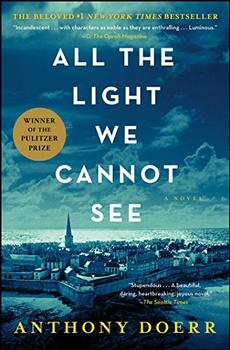Summary | Excerpt | Reading Guide | Reviews | Beyond the Book | Readalikes | Genres & Themes | Author Bio

Something rattling softly, very close. She eases open the left-hand shutter and runs her fingers up the slats of the right. A sheet of paper has lodged there.
She holds it to her nose. It smells of fresh ink. Gasoline, maybe. The paper is crisp; it has not been outside long.
Marie-Laure hesitates at the window in her stocking feet, her bedroom behind her, seashells arranged along the top of the armoire, pebbles along the baseboards. Her cane stands in the corner; her big Braille novel waits facedown on the bed. The drone of the airplanes grows.
The Boy
Five streets to the north, a white-haired eighteen-year-old German private named Werner Pfennig wakes to a faint staccato hum. Little more than a purr. Flies tapping at a far-off windowpane.
Where is he? The sweet, slightly chemical scent of gun oil; the raw wood of newly constructed shell crates; the mothballed odor of old bedspreads—he's in the hotel. Of course. L'hôtel des Abeilles, the Hotel of Bees.
Still night. Still early.
From the direction of the sea come whistles and booms; flak is going up.
An anti-air corporal hurries down the corridor, heading for the stairwell. "Get to the cellar," he calls over his shoulder, and Werner switches on his field light, rolls his blanket into his duffel, and starts down the hall.
Not so long ago, the Hotel of Bees was a cheerful address, with bright blue shutters on its facade and oysters on ice in its café and Breton waiters in bow ties polishing glasses behind its bar. It offered twenty-one guest rooms, commanding sea views, and a lobby fireplace as big as a truck. Parisians on weekend holidays would drink aperitifs here, and before them the occasional emissary from the republic—ministers and vice ministers and abbots and admirals—and in the centuries before them, windburned corsairs: killers, plunderers, raiders, seamen.
Before that, before it was ever a hotel at all, five full centuries ago, it was the home of a wealthy privateer who gave up raiding ships to study bees in the pastures outside Saint-Malo, scribbling in notebooks and eating honey straight from combs. The crests above the door lintels still have bumblebees carved into the oak; the ivy-covered fountain in the courtyard is shaped like a hive. Werner's favorites are five faded frescoes on the ceilings of the grandest upper rooms, where bees as big as children float against blue backdrops, big lazy drones and workers with diaphanous wings—where, above a hexagonal bathtub, a single nine-foot-long queen, with multiple eyes and a golden-furred abdomen, curls across the ceiling.
Over the past four weeks, the hotel has become something else: a fortress. A detachment of Austrian anti-airmen has boarded up every window, overturned every bed. They've reinforced the entrance, packed the stairwells with crates of artillery shells. The hotel's fourth floor, where garden rooms with French balconies open directly onto the ramparts, has become home to an aging high-velocity anti-air gun called an 88 that can fire twenty-one-and-a-half-pound shells nine miles.
Her Majesty, the Austrians call their cannon, and for the past week these men have tended to it the way worker bees might tend to a queen. They've fed her oils, repainted her barrels, lubricated her wheels; they've arranged sandbags at her feet like offerings.
The royal acht acht, a deathly monarch meant to protect them all.
Werner is in the stairwell, halfway to the ground floor, when the 88 fires twice in quick succession. It's the first time he's heard the gun at such close range, and it sounds as if the top half of the hotel has torn off. He stumbles and throws his arms over his ears. The walls reverberate all the way down into the foundation, then back up.
Excerpted from All the Light We Cannot See by Anthony Doerr. Copyright © 2014 by Anthony Doerr. Excerpted with permission by Scribner, a Division of Simon & Schuster, Inc.
Your guide toexceptional books
BookBrowse seeks out and recommends the best in contemporary fiction and nonfiction—books that not only engage and entertain but also deepen our understanding of ourselves and the world around us.